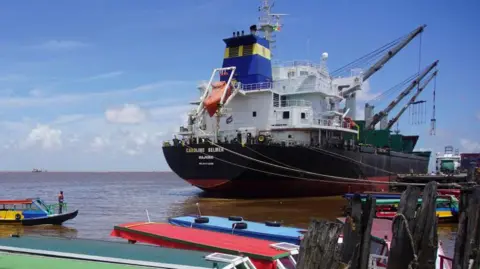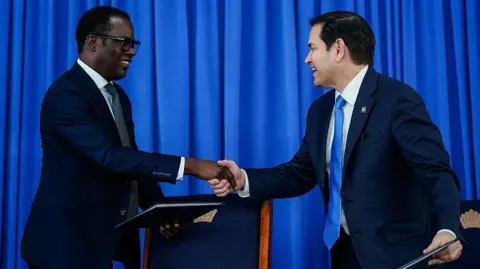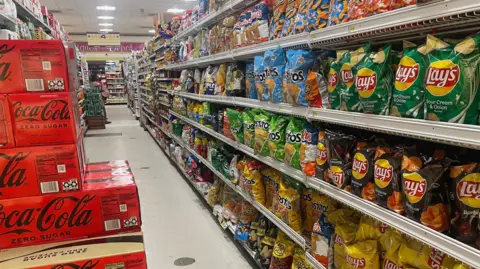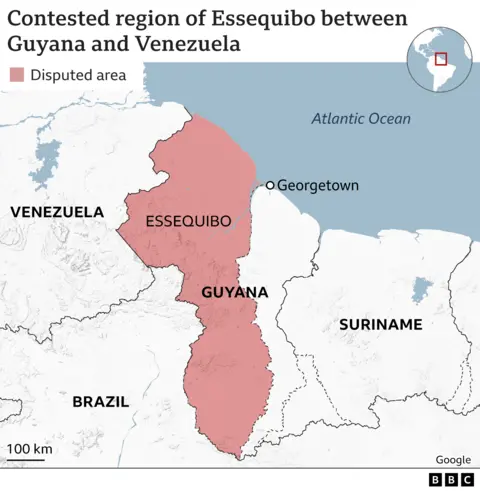[ad_1]
Business reporter
 Getty Images
Getty ImagesThe Caribbean nation of Guyana is breathing a sigh of relief after US President Donald Trump announced a 90-day pause on the introduction of higher tariffs on a number of countries.
Guyana, which is nestled between Venezuela and Suriname on the South American mainland, had been singled out for rates of 38% on many of its exports.
Following Trump’s change in policy, it now faces tariffs of only 10% – the same as all countries apart from Canada, China and Mexico.
But why had Guyana been facing a higher levy in the first place?
Guyanese political commentator Francis Bailey says the country is caught in a geopolitical battle between the US and China. Or more specifically – Washington objects to Beijing’s “very strong foothold” in Guyana.
Recent years have seen billions of dollars of investment in Guyana by Chinese entities, in everything from roads and hospitals, to hotels and shopping centres. And a crucial new bridge linking the capital Georgetown to the western region of Demerara-Mahaica is currently under construction by a Beijing-based company.
For its part, the US continues to be happy to buy Guyana’s key exports of crude oil, gold and bauxite, which is the ore from which aluminium is extracted. These were all to be exempt from the planned 38% tariff, which instead would have hit Guyana’s fishing and sugar industries.
The US also backs Guyana in its territorial dispute with Venezuela over the vast Essequibo region that forms the western two thirds of Guyana. During a visit to Georgetown in March, Secretary of State Marco Rubio warned Venezuela of “consequences” if it were to use force against Guyana.
But the planned high tariff showed Washington’s ire, says Mr Bailey. “I think the reason we had been given such high tariffs is to apply pressure on Guyana.
“The US is saying, ‘if you want our protection you need to chase the Chinese out of your country’. Trump is a very transactional president – and Guyana is in a very precarious position against its sabre-rattling adversary Venezuela which has been ramping up acts of aggression.”
 Francis Bailey
Francis BaileyThe Guyanese government did not respond to requests for comments. The country, once one of the poorest nations in the western hemisphere, and a former British colony, has been enjoying a surge in wealth since it first discovered oil in its territorial waters in 2015.
Last year it exported $3.13bn (£2.4bn) of crude oil to the US, according to United Nations figures.
Across the Caribbean all countries now face a 10% tariff on their exports to the US. However, it is the price impact of Trump’s global tariffs on what they import from the US that is of most concern.
This is because the Caribbean’s love for, and reliance on, US products is immediately apparent when you glance at a High Street or supermarket shelf across the region. In fact, some islands are said to import as much as 70% of their consumer goods from their North American neighbour.
And with American goods that rely on overseas raw materials or components set to go up in price, this will inevitably be passed on to consumers in the Caribbean.
Also, much of what Caribbean nations buy from other countries around the world comes to them via the US.
So with the White House now hitting Chinese goods coming into the US with tariffs of 125%, Chinese items that are then reexported to the Caribbean should see price hikes of a similar amount. And by around 10% for goods from other countries that arrive via the US.
With already ever-increasing shipping costs in the Caribbean, and high local import duties causing exorbitant prices in a region beset by low wages, the impact of Trump’s tariffs could be profound and keenly felt.
 Getty Images
Getty ImagesIn Antigua and Barbuda, interior designer Carissa Warner tells the BBC that 70% of her materials are imported from the US, and 20% from China.
“Some of my projects are on hold while we wait to see what happens,” she explains. “I am extremely worried from a business aspect but also just as a local consumer.
“I’m so worried about the cost of food I have been looking online for pots to start growing fresh produce. I don’t think people realise the impact it will have on us.”
Ms Warner believes one way Caribbean governments could ease the squeeze on their people is by lowering their own import duties, which are partially calculated using a percentage of an item’s cost.
Antigua and Barbuda’s Prime Minister Gaston Browne has dubbed global tariffs “extremely worrisome” and is urging citizens to “buy smarter and buy local”.

Trump’s tariffs come as the Caribbean is already grappling with a confluence of harsh economic conditions from the cost of cleaning up after frequent natural disasters like hurricanes, to the aftereffects of the Covid pandemic.
Antigua and Barbuda’s ambassador to the US, Sir Ronald Sanders, says that the US has long enjoyed a trade surplus with most Caribbean countries.
“For decades, we have helped sustain American prosperity by collectively importing far more from the United States than we export,” he says.
“The problem we have created for ourselves is that we have been dependent on the US market for such a long time and have not sought to diversify into other markets.”
As for the 10% tariff on Caribbean exports to the US, Sir Ronald says: “Any loss is not a good thing for our small economies, but the 10% that we face is not going to disrupt our goods from going to the US market.”
The Caribbean islands’ small market sizes, high labour costs and remoteness from principle markets has kept their manufacturing sectors relatively modest. Their exports include many niche products like specialist rums and indigenous foods such as ackee, a fruit from Jamaica.
“These kinds of products are all orientated to a certain kind of market and will not face any competition because the US does not produce them, and the countries that do face their own tariffs,” Sir Ronald continues.
Exacerbating worries in the Caribbean are potential additional taxes on Chinese-built ships entering US ports of up to $1.5m per docking. This idea was mooted by the White House in February.
Many fear that will aggravate freight costs in the Caribbean, and lead to further hikes in the price of everyday goods, given the large volume of items sold in the region that are manufactured in China.
Sir Ronald adds that tacking the problem of an overreliance on the US “can only come from diversifying the market, but that’s not an overnight achievement”.
He adds: “It’s not as easy to set up new markets as people think. It’s not governments who control trade; it’s the private sector. And much of what we buy will still come via the US.”
Many Caribbean leaders feel the best strategy to thwart the fallout from tariffs is to negotiate as a bloc.

Mia Mottley, chair of the intergovernmental group Caricom, said the region was facing the most challenging of times since its 15 member states gained independence several decades ago.
“We are working and will continue to work to become more self-sufficient, but… this trade war will mean higher prices for all of us,” she said in a recent statement.
Ms Mottley added that it was vital to redouble efforts to “invest in Caribbean agricultural production and light manufacturing”.
“We must build our ties with Africa, Central and Latin America, and renew those ties with some of our older partners around the world, in the United Kingdom and Europe, and in Canada. We must not rely solely on one or two markets.”
Ms Mottley, who is also the prime minister of Barbados, is calling for Washington to “work with” the Caribbean to keep prices down.
She added: “To the United States, I say this simply: ‘We are not your enemy. We are your friends’.”
[ad_2]
Source link




